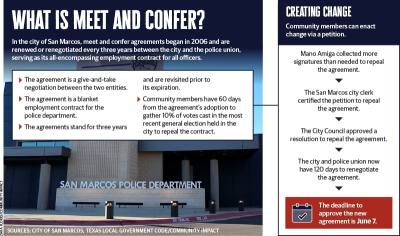“Sometimes, we really do have to knock everything down and recreate something, as a community, until we see change,” Council Member Alyssa Garza said.
Initially, Gleason motioned to deny, but the vote failed 3-4.
“I think it’s unfortunate that the voters are not going to have a chance to have a say in this,” Gleason said. “This was an opportunity to send this to the community ... and find out where the community stood on this.”
Meet and confer agreements are also referred to as collective bargaining agreements because the two entities, the city of San Marcos and the SMPOA, must negotiate
the terms of the agreement as it pertains to employment, wages, protected rights of officers and more.
“They reach an agreement through compromise and each side keeps giving things up until its accepted,” Director of Advocacy at the University of Texas School of Law Mike Golden said.
The city and police union held special meetings throughout the summer of 2022 to negotiate the terms of the new agreement that would be adopted and in effect through Sept. 30, 2025.
The San Marcos City Council approved the fifth meet and confer agreement in the city’s history Sept. 6. However, the public is not involved in the negotiation process which can be worked around through the Texas Local Government Code, Golden added.
“Under Chapter 142, specifically section 142.066, voters have 60 days after the city council ratifies a meet and confer agreement to file a petition objecting to the agreement,” Golden said. “The petition must be signed by a number of registered voters residing in the municipality equal to at least 10% of the votes cast at the most recent general election held in the municipality.”
Following the submission and certification of the petition, the council can either vote to repeal the agreement or send it to the voters.
The fatal catalyst
The petition to repeal the existing contract stems from a fatal car accident that happened June 10, 2020 between two civilians, Jennifer Miller and Pam Watts, and then-San Marcos Police Sergeant Ryan Hartman.
Hartman was off-duty when he allegedly sped through a stop sign and collided with Miller and Watts in Lockhart, according to a Sept. 3, 2021 statement from the city of San Marcos. Watts sustained traumatic injuries; her life partner, Miller, died from injuries incurred in the accident.
“I’ve got a traumatic brain injury that I’m still suffering [from]. I don’t know that [I] will ever recover,” Watts said. “It’s altered my life on so many fronts for the rest of my life.”
Responding Lockhart Police Officers found an open, half-full 24-ounce can of beer in Hartman’s car, though he denied drinking and driving. Investigating officers reported seeing no signs of intoxication when speaking to Hartman at the scene of the crash, according to the statement from the city.
“It took me a long time to recover, physically and emotionally. It took me a while to process all of it myself,” Watts said.
Eventually, Watts partnered with Mano Amiga to try and bring justice for Miller’s death and create a worthwhile change within the police department.
“To me, this was very personal. I wanted to fight for Jen,” Watts said.
On the two-year anniversary of Miller’s death, Watts and Mano Amiga held a press conference to announce their demands for the new police union contract, of which negotiations had just begun.
“We are demanding that the five Hartman Reforms are reflected in the meet and confer agreement that the city will sign with the police union at the end of the summer,” Mano Amiga Communications Director Sam Benavides said. “At that point, we will have 60 days to collect signatures from 10% of the number of San Marcos voters who voted in the last general election.”
This press conference came on the heels of Mano Amiga announcing they had collected enough signatures to secure the marijuana decriminalization ballot initiative for the November election.
“We now have a significant contact list, volunteer base and knowledge of what strategies do and do not work for the petition,” Benavides said.
According to the city of San Marcos, an initial charge of criminally negligent homicide was brought before a grand jury in Bastrop County, which declined to pursue charges.
Hartman was charged with a Class C misdemeanor traffic violation, according to the statement.
The five reforms
The Hartman Reforms, named after the sergeant who changed Watt’s life forever, aim to increase police oversight and improve transparency within the police department.
“I am actually very pro-law enforcement. It is a needed entity within our society. But when one has done wrong, they need to address that wrongdoing,” Watts said.
The first reform calls for the end of the 180-day rule which falls under investigations and disciplinary suspensions of the agreement. A police officer cannot be reprimanded or disciplined for an incident 180 days after it occurs.
Watts alleges that Chief Standridge told her the department would not investigate the accident as the 180-day rule is in effect and the statute of limitations has passed. However, it had only been 141 days at that point.
The second reform calls for the end of delayed interviews for misconduct which falls under protected rights of officers. Police officers involved in an investigation have 48 hours to review any and all evidence including photos, videos and recordings before giving an official statement.
The third reform calls for transparency regarding police officer personnel files as it relates to documented misconduct.
The fourth reform calls for the end of third-party arbitration.
The fifth and final reform calls for the end of vacation forfeiture as a substitute for suspension.
“The public, with this petition, has made it clear that they do not want an agreement without all five of these items,” Golden said.
Back to square one
The clock has started following council action Feb. 7 to renegotiate the meet and confer agreement. The city and SMPOA have 120 days to renegotiate terms and come to an agreement by June 7.
However, the council only approved a resolution to repeal the agreement; the vote does not guarantee that the five Hartman Reforms will be included in the new agreement. That is yet to be determined during the renegotiation process which could pose a problem.
Police unions have been steering clear of additional police monitoring being included in meet and confer agreements, Golden said.
“The general bargaining positions of most police unions is that they do not want these provisions to be in meet and confer agreements. [They] would rather not sign an agreement where [the city] promises to subject them to scrutiny and review,” Golden said.
If the two parties were to adopt a new agreement that does not include those reforms, community members could circulate yet another petition to repeal it and the cycle would continue.
“The difficulty is hearing some of what we heard today about ‘We’re going to draw a line in the sand and say that all five Hartman Reforms have to be negotiated or we’re going to come back,’” Interim City Manager Stephanie Reyes said. “That doesn’t give us any room to negotiate because that’s what it is, it has to be agreed to by the other side. If they don’t agree to it, then we go back to civil service.
If reverted back to civil service, hiring, promotions, suspensions, protected rights of officers, investigations and disciplinary suspensions, work schedules and more would be affected, according to agenda documents.
If the new agreement does not include all five Hartman Reforms, Mano Amiga will continue to engage with and educate the community about how the agreement does and does not address transparency, Benavides said.









